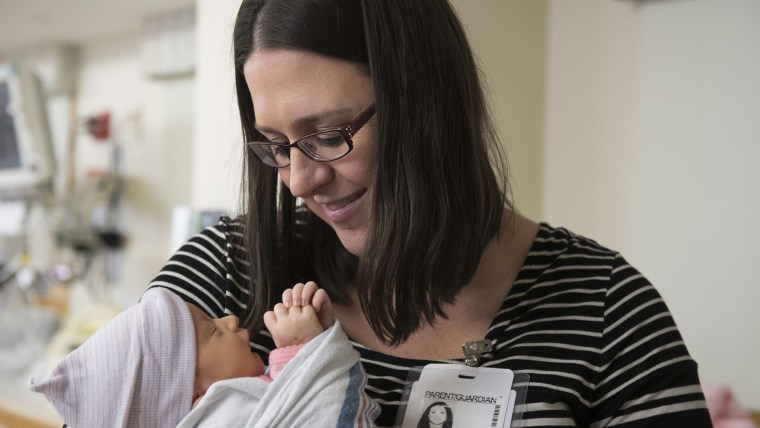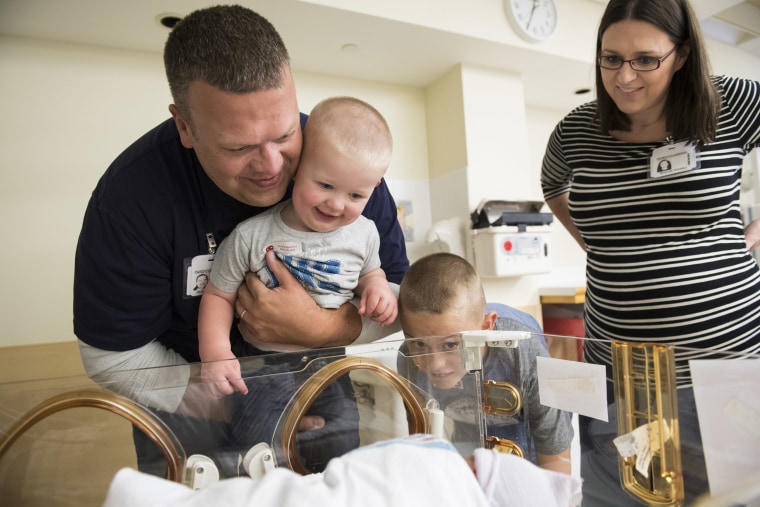After hosting a two-day conference at work, Brenda Vronko felt exhausted. Organizing the event always tired her, but at 36 weeks pregnant, she felt more worn down than usual. She decided to skip a family reunion to recover, but as she relaxed, she noticed something seemed off. The baby — who normally moved constantly — was barely moving.
“During lunch, she moved like five or six times,” Vronko, 37, of Ludington, Michigan, told TODAY. “I wasn’t concerned at that point because I was overly tired and I assumed the baby was, too.”

Vronko took a nap, but that didn’t energize the fetus.
“She was a very active baby. When I would wake up, she would be bouncing around,” she said.
The baby just wasn't moving enough and Vronko tried everything to encourage her. She walked around, but still no stirring from the baby. When Vronko explained to her husband Jeremy that the baby was sluggish, he suggested a dinner that always got the baby kicking — pizza and breadsticks.
“They were like fireworks for Brenda and the baby,” Jeremey told TODAY.
But even the high-carb meal didn’t work and Vronko decided to visit the hospital, just to be safe. After arriving, doctors monitored the baby, who moved only once. Healthy babies should move 10 times an hour.
“I was starting to panic,” Vronko said. “She didn’t move hardly at all.”
Doctors gave Vronko fluids, thinking the baby was dehydrated, but she still didn’t move. That’s when doctors noticed that the baby was experiencing heart deceleration and realized they had to perform an emergency cesarean section.
“After her delivery, I knew at once something was wrong,” Vronko said. “I got to see her very quickly and she was very, very pale. Jeremy described her as ‘ghostly white.’”

The baby, who the Vronkos named Aubrey, experienced a rare condition called fetal maternal bleeding. While babies and mothers share some blood through the placenta in a normal pregnancy, fetal maternal bleeding occurs when baby leaks too much blood into her mom. Experts remain unclear why it happens, but it often occurs after a mom experiences an accident, such as a fall or a fender bender. But that wasn’t the case for Vronko.
“Rarely, we will have one that just happens and we don’t know why,” said Dr. David Colombo, division chief for maternal fetal medicine at Spectrum Health in Grand Rapids, Michigan, who did not treat Vronko.
Aubrey had lost most of her blood volume and was severely anemic. Doctors remain unsure how long Aubrey was bleeding, but think it occurred over several weeks.
“It is impossible to say how long it lasted,” said Dr. Mitch DeJonge, a neonatologist at Helen DeVos Children’s Hospital in Grand Rapids, Michigan, who treated Aubrey. “Because it happened over weeks, the baby compensated by drawing more fluid so she was able to circulate an adequate amount of blood volume.”
After her delivery, doctors whisked Aubrey to Helen DeVos Children’s Hospital where she received a blood transfusion, which treated her anemia and blood loss.
"I just can’t credit Brenda enough; she really listened to her body," said Jeremy.
Vronko’s instinct to go to the hospital saved Aubrey's life.
“A baby should move 10 times an hour,” Colombo said. “Decreased movement is the most common way people present with fetal maternal bleeding.”

Colombo urges pregnant women to seek help if something feels off.
“Sometimes the people who are the sickest can’t put their finger on it. They don’t feel right. I want to see those people,” he said. “There should never be the barrier to seeking help if you are concerned.”
While an emergency C-section is often the treatment for fetal maternal bleeding, doctors can do an in-utero blood transfusion for early-term babies who have it. Severe and untreated fetal maternal bleeding can lead to organ damage or death.
Aubrey, who weighed 6 pounds at birth, was in the neonatal intensive care unit for 17 days. Today, she’s thriving at home and only needs twice-daily iron drops.
“There is no absolute indication she will have any problems in the future. But she needs to be watched closely," DeJonge said.
Vronko wanted to share her story to encourage other women to trust their instincts.
“I knew something wasn’t right,” she said. "In this case, it saved her life."